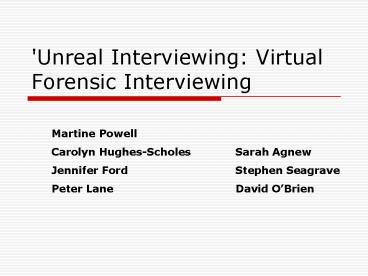'Unreal Interviewing: Virtual Forensic Interviewing - PowerPoint PPT Presentation
1 / 10
Title:
'Unreal Interviewing: Virtual Forensic Interviewing
Description:
'Unreal Interviewing: Virtual Forensic Interviewing. Martine Powell ... Q. What is a forensic interview? ... line training in forensic interviewing of children? ... – PowerPoint PPT presentation
Number of Views:275
Avg rating:3.0/5.0
Title: 'Unreal Interviewing: Virtual Forensic Interviewing
1
'Unreal Interviewing Virtual Forensic
Interviewing
- Martine Powell
- Carolyn Hughes-Scholes Sarah Agnew
- Jennifer Ford Stephen Seagrave
- Peter Lane David OBrien
2
Q. What is a forensic interview?
- An interview where the purpose is to elicit
accurate, detailed and reliable information from
an interviewee about an event or situation.
3
Q. Skills required of forensic inters?
- Establish rapport with child
- Provide clear groundrules
- Adopt an open-minded approach
- Adhere to certain procedural and/or legislative
requirements - Use open-ended questions
4
Q. Why the need for on-line training in forensic
interviewing of children?
- A. Training currently isnt working.
5
Q. What specific skills need to be mastered to
maintain open-ended questions?
- Define OQs and establish why impt
- Recognise various types of OQs
- Choose the most effective OQ at various stages of
an interview - Vocalise the right questions
- Sustain regular (effective) practice
- Engage in critical evaluation (objective)
- Recognise and overcome organisational barriers to
change
6
Q. Activities in on-line course
- Readings
- Film
- Rote learning tasks
- Mock interviews with adult playing role of child
- Computer simulated interviewing
- Quizzes
- Audio files/transcripts
- Workshop
7
Q. Major challenges to training?
- Pre-training baselines are poor (cultural,
job-related) - Knowledge does not equate good practice
- Transfer of training is poor unless mock
interview exercises provide the stimuli that
would normally provoke an inappropriate
(specific) question - Little incentive (within organisations) for
practising skills - Financial constraints, high workloads and staff
turnover - Trainees are resistant to believing in the
benefits of persisting with open-ended questions.
8
Q. Major challenges to training?
- Legislative constraints on access to field
interviews for evaluation purposes - Lack of empirical research to guide the
development of training programs
9
Q. Whats the precise contribution of the
simulated (virtual) interview over and above
equivalent pencil and paper task?
- Dont know.
10
Depends on..
- The precise contribution of (a) Beliefs (b)
Knowledge (c) Habit (doing) - The degree to which we have captured the critical
elements of the interview environment - Whether concepts are better encoded/stored/retriev
ed in virtual environment?































